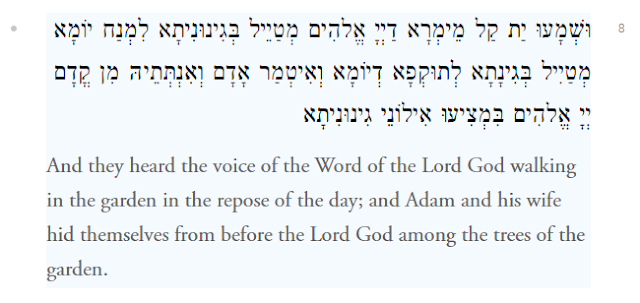Memra D'Hashem - Word of Hashem
 |
| Genesis 3:8 |
Have you ever heard the term of The Word of Hashem in Aramaic? It's Memra D'Hashem. Most Christian would relate this to their New Tastement that it's talking about The Word a.k.a Ho Logos a.k.a Yeshu.
But does it necessarily referring to him? Of course not! And how do we know that and how do we prove that? There's several vital point we need to look first;
1. The Purpose of the Targum
Targum [lit. Translation] is the translation of the Torah into common language of listeners that don't speak Hebrew. There's several example of Targumim; Targum Onqelos, Targum Yonathan (Midrashic Targum), Tafsir Rasag / Targum Rav Saadia Gaon, etc.
Despite only being a translation, it also might contain interpretations, to make the verse to become clearer to the listeners/readers and avoid misunderstandings.
2. The Background of the Targum
The Targum is a media that's used to deliver the message of the Torah through a common language that can be understood by those who don't speak Hebrew. It's started back in the Babylonian Exile, most Babylonian Jews would accept the Targum as an authoritative translations of the Torah [or Miqra] (especially in Aramaic).
The Targumim have their own style of translation, for example in Targum Onqelos as we've talk in "Against Missionary II", it uses "Min Qadam - From before". This kind of sort phrases could change people's perspective while reading the Torah. One of its purpose is To avoid misunderstanding of the verse that'll lead one who's reading it into thinking that G-d [chas v'shalom] possesses an appearance.
3. The Purpose of the phrase "The Word of Hashem"
The phrase has the same purpose as "Min Qadam - From before", which is to avoid misunderstanding of the verse that'll lead one who's reading it into thinking that G-d [chas v'shalom] possesses an appearance. Beside that, it's not only used in Genesis 3:8 that translates "The voice of Hashem" into "The voice of the Word of Hashem."
Here's some others example of the phrase:
"I will cover thee with My Memra," instead of "My hand" (Targ. Ex. xxxiii. 22). Instead of "My soul," "My Memra shall reject you" (Targ. Lev. xxvi. 30; comp. Isa. i. 14, xlii. 1; Jer. vi. 8; Ezek. xxiii. 18). "The voice of the Memra," instead of "God," is heard (Gen. iii. 8; Deut. iv. 33, 36; v. 21; Isa. vi. 8; et al.). Where Moses says, "I stood between the Lord and you" (Deut. v. 5), the Targum has, "between the Memra of the Lord and you"; and the "sign between Me and you" becomes a "sign between My Memra and you" (Ex. xxxi. 13, 17; comp. Lev. xxvi. 46; Gen. ix. 12; xvii. 2, 7, 10; Ezek. xx. 12), etc.
Source : https://www.jewishencyclopedia.com/articles/10618-memra
You are a shelter for me, from an adversary You guard me;
with songs of deliverance You encompass me forever,
(Psalms 32:9)

alangkah baiknya bila disertai terjemahan dalam bahasa Indonesia, mengingat mereka yang kemampuan bahasa inggrisnya pas pas-an -apalagi bahasa Ibroni. Seperti saya misalnya ^L^, jumlahnya banyak juga. terjemahan dlm bahasa Indonesia itu insyaAllah akan memudahkan pembelajaran.
ReplyDelete